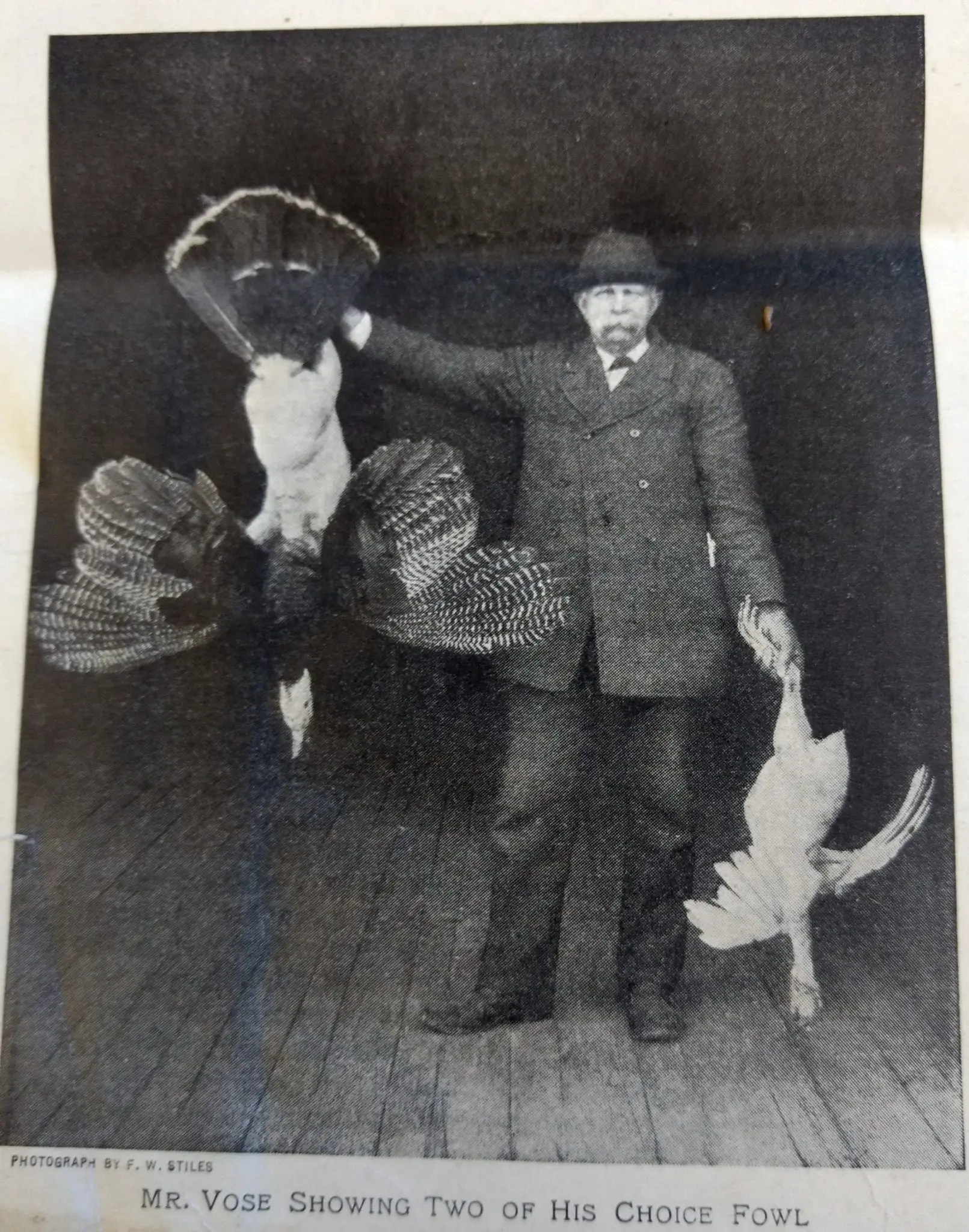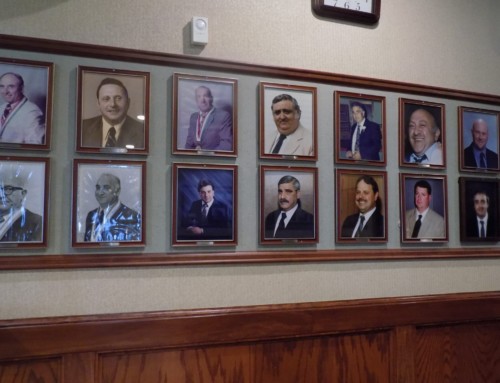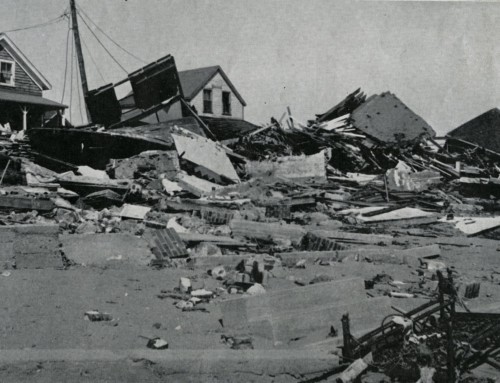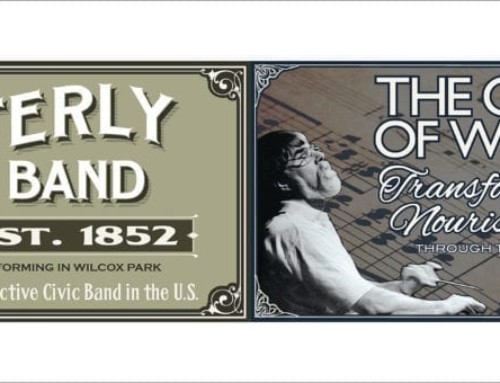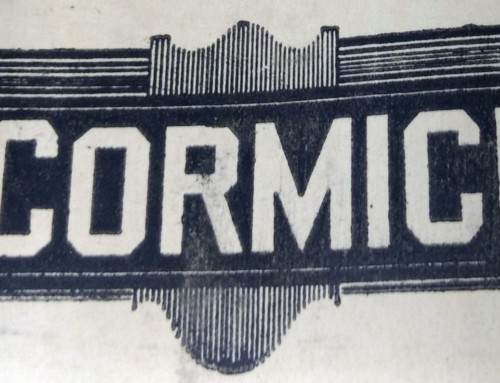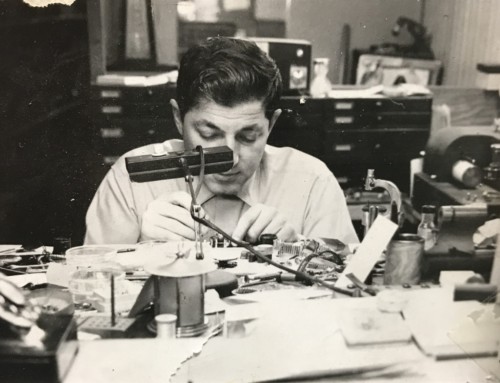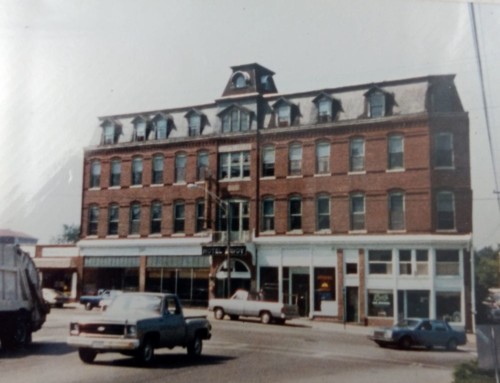In mid-November in the year 1873, a package departed the Westerly Railroad Station bound for Washington D.C. The destination of this package was not just any building in Washington; it was to be sent directly to the White House, where its contents could be enjoyed by President Ulysses S. Grant. Inside the large wooden crate was a turkey to be served on Thanksgiving courtesy of Westerly’s own Horace Vose.
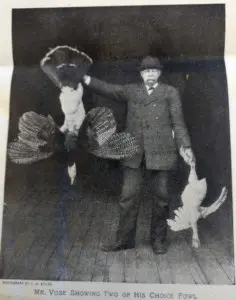
Horace Vose was born in Westerly on May 12, 1840, to Charles Babcock (1807-1869) and Mary Jane Thompson (1816-1883) Vose. [2] From an early age, Horace was surrounded by farms and the animals that lived upon them. In 1860 and 1865, he identified himself as a farm laborer and farmer and by 1870, his profession was given as “stable keeper.” [3] In 1872, Horace married Susan Amanda Cheseboro and they would spend the rest of their lives as residents of Westerly. [4]
In 1873, Rhode Island Senator Henry B. Anthony, being acutely aware of the strong reputation of turkeys from southern Rhode Island, contacted Horace Vose, by then a highly regarded dealer of livestock, about sending a turkey to President Grant. [5] It was said that even after beginning his tradition of providing the presidential turkey, Vose was more well-known locally as a horse dealer than a turkey farmer. [6] In fact, Vose did not raise turkeys himself but bought and sold them throughout the area. [7]
The very first turkey sent to the White House came from the farm of Horace Brightman and weighed a hefty 36 pounds. [8] Vose was assisted with his deliveries by Senator Anthony who had a close connection with President Grant, having twice been elected as President Pro Tempore, the Senate’s highest post. [9] Upon Anthony’s death in 1885, Vose was subsequently assisted by his neighbor, Senator Nathan F. Dixon III. [10]
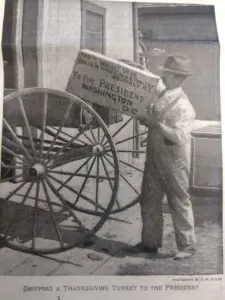
For many years, Horace Vose served as something of a jack-of-all-trades in Westerly, working as an auctioneer, an ice dealer, a horse dealer, and a livery owner. [14] Vose often traveled far and wide to obtain the livestock which he would deal in Westerly, as there are accounts of his presence as far west as Iowa. [15] Notably, although the turkeys that Vose supplied were shipped from Rhode Island, they often were actually brought in from Virginia, Kentucky, Iowa, and other states. [16]
For 40 years running after the initial delivery in 1873, Horace Vose continued to send turkeys to the White House twice a year. Apparently, by 1893 the tradition had grown in scope and efficiency as one newspaper article mentions that Senator Dixon was to serve as Chairman of the “Turkey Committee.” [17] Vose’s act remained relatively unknown for several years, as there are virtually no accounts of the presidential turkey shipment between 1873 and 1893.
Horace Vose made good on his desire to provide the finest turkeys to the White House no matter who was serving as the chief executive at the time. As one account claimed: “In the matter of turkeys, Vose was a hidebound non-partisan.” [18] Another story noted, in 1896 Vose shipped a turkey to President Grover Cleveland, a Democrat, along with a note reading: “I voted the Republican ticket this fall. Did not have quite as good business as I hoped, the last year, but I want to be sure you have a good Rhode Island turkey, so I send you a half blood, wild one, which please accept.” [19]
It was said that when Cleveland had passed through Westerly several years prior, Vose introduced himself and the president “gave his [Vose’s] big, sun-browned hand an extra pressure and expressed pleasure at meeting him.” [20] Vose never failed to receive a note of thanks from President Cleveland and they served as a point of pride for the Turkey King, who framed the notes which were “the pride of the entire community.” [21]
1896 turned out to be quite the year for Horace Vose. In addition to his shipments to President Cleveland, he also provided turkeys for President-elect William McKinley. [22] On top of that shipment, Vose was also asked to ship a turkey from North Stonington to Queen Victoria. [23] The article covering this request mentioned that although Vose had hoped to receive a note from the Queen of England, no such note ever arrived. [24] After many years of shipping turkeys domestically, Vose expanded his scope and was known to sometimes ship turkeys to Europe and South Africa. [25]
Throughout his lifetime, Horace Vose gained a reputation as a highly-regarded livestock supplier with a keen eye for quality. It was said that a presidential turkey delivered by Vose never weighed less than 25 pounds. [26] A particular method was strictly adhered to, namely: “When killed and dressed for shipment to the White House, the turkeys were left with head, wings, tail-feathers, and feet all on for this was the method of preparing the very finest birds for market.” [27]
As a result of Vose’s strong reputation and the notoriety he received from providing the presidential turkeys, he grew very popular, however, he also “became very wary of strangers, seldom allowing any about his grounds.” [28] On December 20, 1913, Horace Vose died in Westerly after suffering from a heart ailment. He was buried in River Bend Cemetery alongside his wife and children. [29]
It was said that after Horace Vose’s death, Rhode Island turkeys fell below presidential standards and turkeys were shipped to the White House from elsewhere in America. [30] Although it is unfortunate that the tradition died with Vose, in the annals of local lore, it will always be remembered that for 40 years, the leader of the United States of America dined on Westerly turkeys every Thanksgiving and Christmas.
[su_accordion class=””] [su_spoiler title=”Footnotes” open=”no” style=”default” icon=”plus” anchor=”” class=””]
- “Glorified the Turkey” Norwich Bulletin, 23 December 1913.
- Rhode Island Births and Christenings, 1600-1914, Horace Vose, May 1840 and death record of Oscar Vose, 11 January 1927.
- Household of Charles B. Vose, Westerly, Washington, Rhode Island, 1860 United States Census, Family No. 295 and Household of Horace Vose, Westerly, Washington, Rhode Island, 1865 Rhode Island Census, Line Number: 28, Household number: 434, Volume Number: 3, Page Number: 127.
- Household of Horace Vose, Westerly, Washington, Rhode Island, 1900 United States Census, Page: 29; Enumeration District: 0241; FHL microfilm: 1241513.
- The Old Stone Bank, “The Rhode Island Turkey,” (1931), pg. 7.
- Palmer, Henry Robinson, “Where the President’s Turkey Comes From” The Ladies’ Home Journal, November 1901.
- The Old Stone Bank, “The Rhode Island Turkey,” (1931), pg. 7.
- The Old Stone Bank, “The Rhode Island Turkey,” (1931), pg. 7.
- United States Senate, “Henry B. Anthony: A Featured Biography, https://www.senate.gov/artandhistory/history/common/generic/Featured_Bio_Anthony.htm.
- The Old Stone Bank, “The Rhode Island Turkey,” (1931), pg. 7.
- The Old Stone Bank, “The Rhode Island Turkey,” (1931), pg. 7.
- Palmer, Henry Robinson, “Where the President’s Turkey Comes From” The Ladies’ Home Journal, November 1901.
- “Has Furnished Turkey” Dakota Farmers’ Leader (Canton, S.D.), 12 December 1902.
- Westerly City Directories, 1873-1913, Ancestry.com.
- The Courier (Waterloo, IA), 30 January 1878.
- Palmer, Henry Robinson, “Where the President’s Turkey Comes From” The Ladies’ Home Journal, November 1901.
- “A Land of Turkeys” The Evening Star (Washington, D.C.), 25 November 1893.
- “Glorified the Turkey” Norwich Bulletin, 23 December 1913.
- “Whence Come the Best Turkeys” New York Herald, 23 December 1894.
- “Whence Come the Best Turkeys” New York Herald, 23 December 1894.
- “Whence Come the Best Turkeys” New York Herald, 23 December 1894.
- “The National Bird” Evening Star (Washington D.C.), 25 November 1896.
- “Whence Come the Best Turkeys” New York Herald, 23 December 1894.
- “Whence Come the Best Turkeys” New York Herald, 23 December 1894.
- Palmer, Henry Robinson, “Where the President’s Turkey Comes From” The Ladies’ Home Journal, November 1901.
- The Old Stone Bank, “The Rhode Island Turkey,” (1931), pg. 8.
- The Old Stone Bank, “The Rhode Island Turkey,” (1931), pg. 8.
- The Old Stone Bank, “The Rhode Island Turkey,” (1931), pg. 8.
- Gravestone of Horace Vose, FindAGrave, Memorial No. 62611416.
- The Old Stone Bank, “The Rhode Island Turkey,” (1931), pg. 9.
[/su_spoiler] [/su_accordion]
